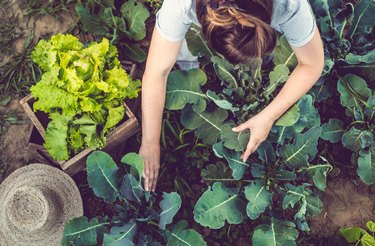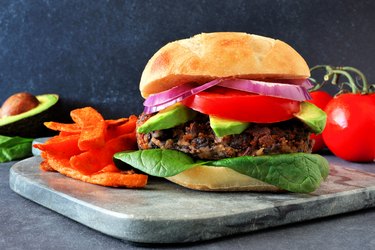
You know eating healthier is good for you. But did you know it benefits the environment, too?
That's right: Consuming foods associated with improved health and lower risk of disease — like whole-grain cereals, fruits, vegetables, nuts, legumes and olive oil — is better for Mother Earth, according to a large analysis published October 2019 in the Proceedings of the National Academy of Sciences (PNAS). Even small changes, such as swapping 10 percent of your daily caloric intake from processed meat/beef for other foods, such as nuts, produce and legumes, can lead to improved health outcomes and a reduction in your dietary carbon footprint, per an August 2021 study in Nature Food.
Video of the Day
Video of the Day
Choose Mostly Plant-Based Foods
Researchers tracked the dietary patterns and health outcomes of tens of millions of people who ate Westernized diets and found that nutritious foods — apart from fish — caused less harm to the environment than foods linked to a higher risk for type 2 diabetes, stroke, coronary heart disease and colorectal cancer, such as unprocessed and processed red meats.
The reason? Overall, producing plant-based foods involves less global greenhouse gasses (GHG) and land use, and it has less of an effect on fresh-water scarcity and nutrient pollution compared to manufacturing animal products.
Eat Fish in Moderation
OK, so what's the deal with fish? It's true that fish are super healthy for you, but they do have a greater impact on the environment than plant-based proteins like nuts and legumes. According to the PNAS study's authors, this is due in part to the wide variety of fish production methods, some of which create more GHG emissions than others.
This doesn't mean you should slash the swimmers from your diet completely, but rather focus on adding more plant-sourced foods into your daily menu.
You Should Still Limit Processed Foods
And what about ultra-processed and sugary foods? Since, in general, these products aren't sourced from animals, they tend to have fewer negative environmental effects too. But that's no excuse to chow down on junk.
Remember, ultra-processed foods contain fewer nutrients and are jam-packed with sugar, salt, saturated fat and additives, which can boost your risk for chronic diseases and an early death, per Harvard Health Publishing.
Lower Your Environmental Impact Even More
The good news? Making better decisions about food can help you live longer and leave a smaller footprint on Mother Earth — a win-win situation.
So, in addition to adding more eco-friendly plant-based foods to your diet and cutting back on red meats, what else can you do to keep the environment in good shape?
A few small adjustments to your food and shopping habits can go a long way, says Leslie Langevin, RD, author of The Anti-Inflammatory Kitchen Cookbook, who offers the following tips for improving environmental sustainability:
- Opt for organic foods, which use fewer pesticides and encourage better land use practices.
- Buy locally sourced fruits and vegetables whenever possible — reducing foods' transportation distance results in less harmful CO2 emissions.
- Choose food items with recyclable packaging and shop with your own reusable grocery bags.

Get Started With This Sample Meal Plan
So, ready to do your part and save the world one meal at a time? Here's a simple, plant-focused meal plan from Langevin that's both good for your health and environmentally conscious.
Breakfast
- Organic oatmeal with maple syrup or local honey
- 1 cup of frozen berries
- 2 tablespoons of pumpkin seeds
or
- Two locally sourced, free-range, organic eggs with sautéed spinach (or other greens) and garlic
- One slice of whole-grain bread with olive oil
Lunch
- Salad with local, in-season veggies with roasted, crispy chickpeas, oil-and-vinegar dressing
- Chia seed pudding on the side
or
- Whole-grain bread with wild, sustainable canned tuna mixed with avocado, onion and celery
- Sweet potato chips
- An apple
Snack Ideas
- Hummus and veggies
- Popcorn with herbs and olive oil
- Trail mix
- Chocolate hummus and an apple
- Edamame
- Peanut butter with celery or an apple
Dinner
- Broiled wild salmon or trout
- Brown rice
- Sautéed broccoli and cauliflower with pesto
or
- Whole-grain pasta or bean-based pasta tossed with sautéed spinach, grilled chicken, garlic, olive oil and cherry tomatoes
or
- Black bean burgers on a whole-grain bun
- Side salad
- Oven-roasted sweet potato fries
- Proceedings of the National Academy of Sciences (PNAS): “Multiple health and environmental impacts of foods.”
- Harvard Health Publishing: “Eating more ultra-processed foods may shorten life span.”
- Nature Food: "Small targeted dietary changes can yield substantial gains for human health and the environment"
Was this article helpful?
150 Characters Max
0/150
Thank you for sharing!
Thank you for your feedback!